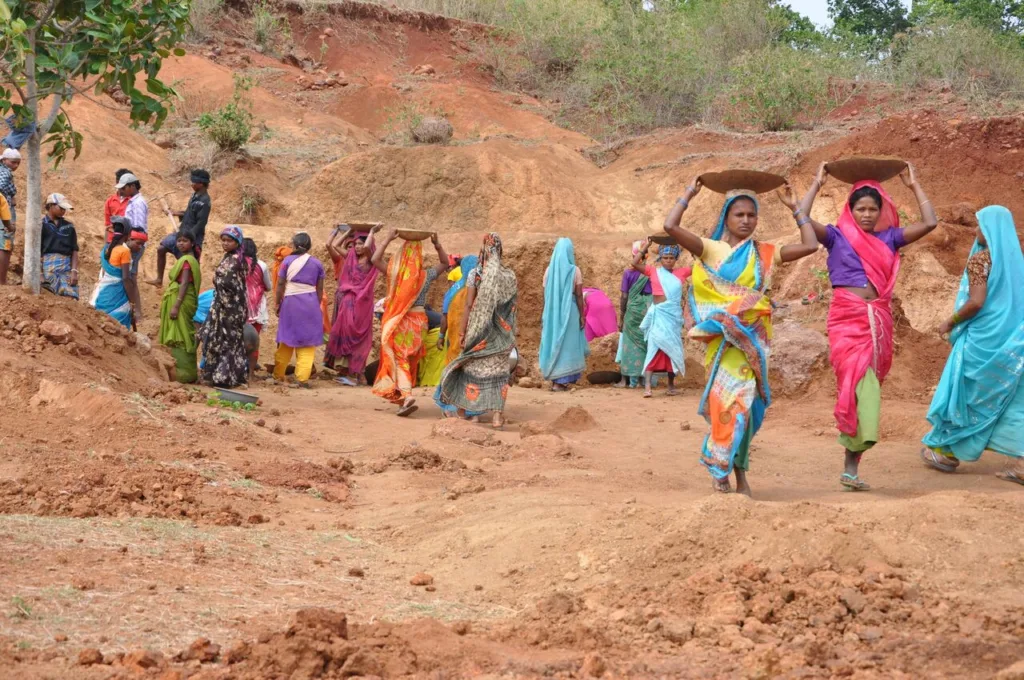A report highlighting the issues and providing recommendations for MGNREGA.
Parliamentary Standing Committee on Rural Development and Panchayati Raj tabled a report highlighting the issues and providing recommendations for MGNREGA.
Key issues with MGNREGS
Inadequate allocation and payment delays
o Reduced Budgetary Allocation: 34% less budgetary allocations in 2021-22 (compared to 2020-21).
o Delayed payment of wages: due to infrastructural bottlenecks, unavailability of funds, and lack of administrative compliance.
o No compensation: for delayed payment of wages due to under-calculation of delays at different payment stages.
Institutional
o Poor capabilities of PRIs: Inadequate administrative and technical resources with PRIs, particularly at Gram Panchayat (GP) level, adversely affect the planning, approval, monitoring and social audit of the scheme.
o Blurred accountability: As financing agency (Centre) and implementing agencies (State and local governments) are different.
o Non-appointment of Ombudsperson: According to the Standing Committee report (Feb 2022), out of 715 possible appointments, only 263 ombudspersons have been appointed.
Systemic issues
o Issues with wage anchor (CPI-AL): Types of work done by the agricultural labourer and MGNREGA workers are different, suggesting minimum wages should be decided per CPI-Rural Laborer (CPI-RL).
o Fabrication of job cards and associated corruption.
o Digital divide adversely affects the implementation of digital attendance, Aadhar Payment Bridge System (APBS), etc.
Issues specific to women
o Non-availability of childcare facilities and other basic amenities: such as safe drinking water, access to sanitation services, etc., at the worksite.
o Low awareness: about the process and entitlements under the scheme.
Recent reforms undertaken by the government
Digitisation
o Digital attendance: Attendance of workers through the National Mobile Monitoring System (NMMS) App under MGNREGS has been mandated for all worksites (except individual beneficiary schemes/projects).
o GIS-based planning (Yuktdhara Portal): Holistic planning of Gram Panchayats based on watershed development principles using the Geographical Information System (GIS).
o SECURE: An online application developed for estimating, preparing and approving MGNREGA works.
o Geo-MGNREGA: To Geo-tag assets created under MGNREGA to ensure effective audit and curb instances of corruption.
o Other digitisation efforts like Direct benefit transfer (DBT), Management Information System (MIS) and
Ombudsman App for smooth reporting and categorisation of grievances.
- Convergence with other schemes: Cluster Facilitation Project (CFP) has been rolled out in 300 blocks of the country, converging MGNREGS and National Rural Livelihood Mission (NRLM) for improved overall effectiveness.
- Social Audit (SA): The system of SA is being strengthened in association with the Comptroller and Auditor General (C&AG) office to provide auditing standards.
- Constitution of Amarjeet Sinha Committee to recommend structural and other reforms required in the rural job guarantee scheme under MGNREGA.
- Other initiatives:
o Project ‘UNNATI’ intends to upgrade the skill base of MGNREGA workers.
o Increase in the number of days of guaranteed work for drought/ calamity affected notified rural areas and tribe households in a forest area.
Recommendations/ Way Forward
Revision of wage anchor: CPI-Rural may be considered the appropriate index for protecting wages against inflation. (Mahendra Dev Committee)
o Also, simplification of the payment process to ensure transparency in wage payments at every stage.
Capacity building:
o Strengthen the administrative and technical capabilities of PRIs by identifying, mobilising, and empaneling institutions that can be training institutions for MGNREGS.
o C&AG should establish a mechanism in consultation with other stakeholders to handhold Gram Sabhas to ensure regular social audits of all projects under MGNREGS.
o Government should frame effective information, education and communication (IEC) policy as beneficiaries should be aware of their rights under a demand-driven scheme.
Women empowerment
o Government should issue modalities and guidelines like the nature of work to be taken up, facilities at the worksite, etc., for women empowerment under the act.
Governance reforms
o Provide an institutional mechanism for convergence of MGNREGS with other schemes such as the National
Afforestation Mission, Mission for Integrated Development of Horticulture (MIDH), Roadside Tree Plantation, etc.
✓ It can help address the issue of inadequate budgetary allocations and ensure effective implementation and monitoring.
o Establish a management support system at national and state levels to provide for a central evaluation and monitoring system.
o Impact assessment of the reforms, like geo–tagging of assets, digital attendance, etc., to identify issues and take corrective measures.

